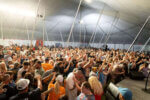Avoid caffeine in large amounts. Herbal equivalents are purer.
Question. With all the bustle of the holidays, I get tired easily. Coffee gets me going in the morning, and throughout the day I often drink more. Is this wise?
M.O., Binghamton, New York
Answer. You’re not alone. Many people today reach for a cup of coffee to boost their energy level, especially first thing in the morning. It’s easier than ever to do. Nowadays there’s a coffee café on almost every corner.
But I want to caution you about using caffeine as a pick-me-up energy drink. Caffeine can cause the jitters and can be addictive. It is also among the crops most heavily sprayed with herbicides and pesticides. So it’s best to avoid caffeine, at least large amounts of it.
If you look at the studies done around the world, you’ll see that every group of people has come up with their own unique and natural solution–herbal usually–to fatigue. These herbs have in them something called isomers of caffeine–they have chemical structures somewhat similar to caffeine.
They’re a mirror image of caffeine, but they do not function like it because they are in a purer form. Most important, they don’t cause the jitters that caffeine does.
One herb is ginseng, American ginseng in particular, which is widely used to boost physical and mental stamina and vitality.
A study presented recently at the Federation of American Societies for Experimental Biology in Washington, D.C., demonstrated the effectiveness of cordyceps, a type of mushroom, in improving energy, fitness and endurance. After taking a cordyceps supplement daily for three months, volunteers in the study had better oxygen utilization, which correlates with better fitness, and were able to complete a mile walk significantly faster than a control group.
Other herbs include quick-acting rhodiola, guarana and mate. These will kick in immediately to perk you up. Taurine, an amino acid added to many energy drinks, enhances muscle contractions in tissues high in electrical activity, such as brain cells.
As with any supplement, these should be taken as directed on the product label.
We all have bouts of decreased stamina and a lack of energy. If a discernible medical ailment is not found, such as low blood sugar, low thyroid function or diabetes, then the fatigue could be caused by stress, burnout, lack of exercise, being overweight or other factors.
Whatever the cause, God has given us certain natural nutrients that can alleviate tiredness and boost our energy levels.
Question. I have always used honey instead of sugar to sweeten my hot cereal or tea. I have heard it is better for you, but I have never heard why it is. Can you tell me?
B.B., Mammoth Lakes, California
Answer. For years we have speculated that honey has health benefits, but there really weren’t many studies to prove this. Recently, University
of California-Davis researcher Dr. Heidrun B. Gross and her colleagues provided scientific evidence. They showed that adding honey to our diets may boost levels of disease-fighting antioxidants in our blood.
According to Gross, honey has compounds called polyphenols that have antioxidant properties. These substances quench free radicals–the unstable byproducts of normal metabolism. The damage these oxidants cause to arteries and DNA can lead to cancer.
In the study, 25 healthy adults added four tablespoons of buckwheat honey to their diet for 29 days. Blood samples taken at the beginning and end of the study showed a direct link between honey consumption and levels of disease-fighting polyphenols. The more polyphenol-containing honey the adults ate, the higher the levels of antioxidants in their blood became.
To increase your antioxidant levels–while satisfying your sweet tooth–Gross recommends adding two to four tablespoons a day to your diet, an amount she says will boost the body’s defense system.
Keep in mind that, in general, the darker the honey, the more antioxidants it contains. For instance, buckwheat honey has more antioxidants than clover honey.
Reginald B. Cherry, M.D., has been practicing diagnostic and preventive medicine for more than 30 years and specializes in the use of nutrition, exercise and natural supplements to lower disease risk. He is the author of several best-selling books, and teaches health and healing through his weekly TV program, The Doctor and the Word. For more about his ministry, go to www.drcherry.org. Before taking any supplement, consult with your healthcare provider.






Leave a Comment
You must be logged in to post a comment.